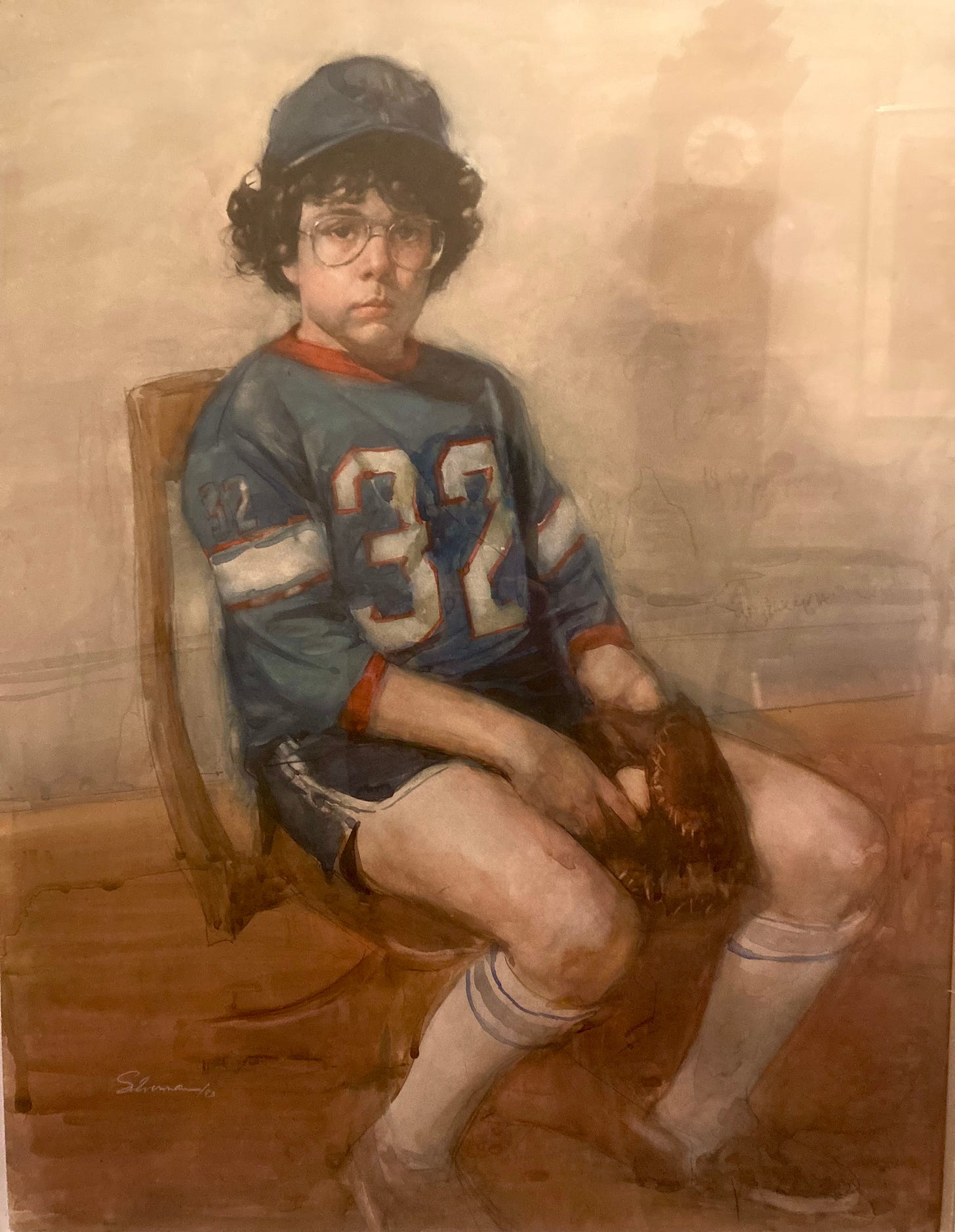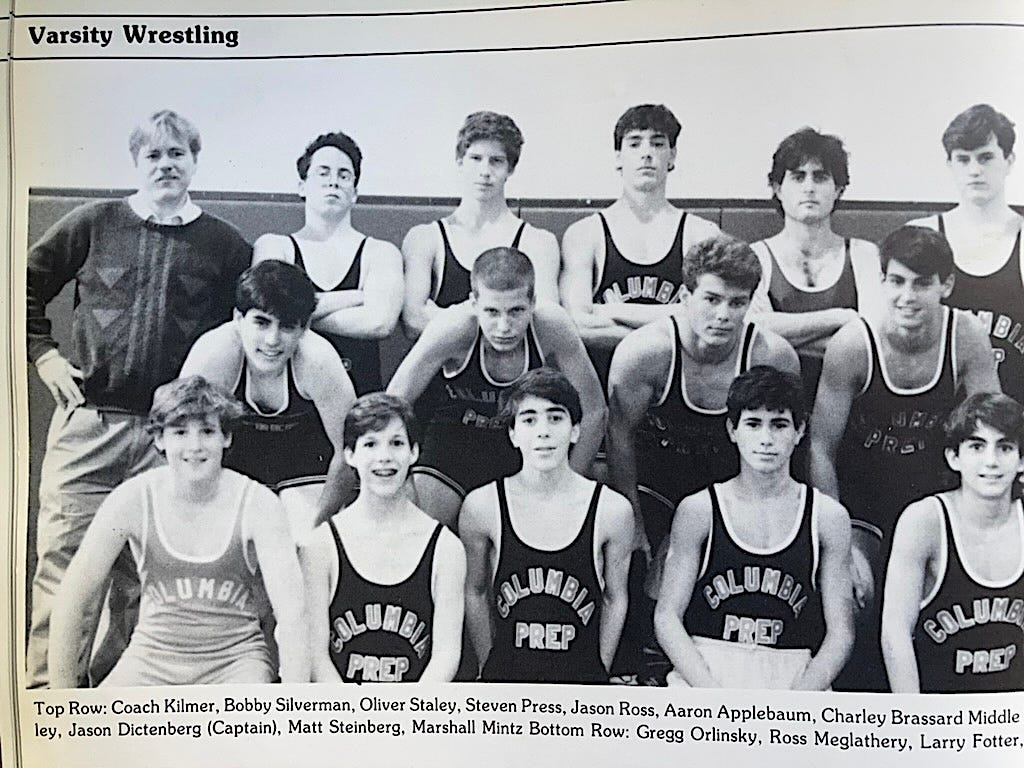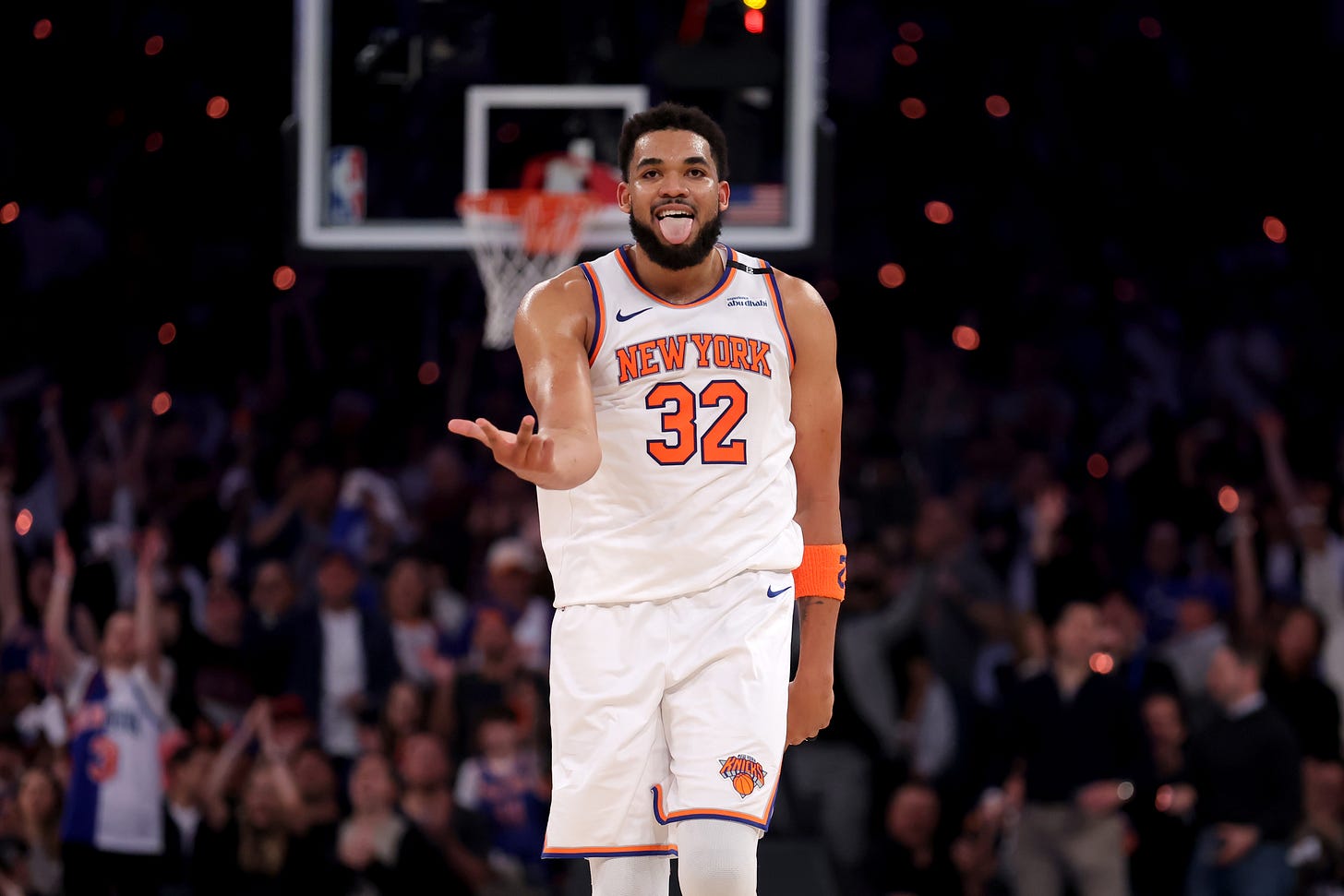Exits: Something darker
Writer Robert Silverman on the Knicks, the authoritarian need of humiliation, outgrowing childhood fears, and Karl-Anthony Towns.
TW: Language
There’s a portrait of me that my father painted when I was 12 that’s still hanging in the entrance to my folks’ place.
It’s an apt portrait, an artifact, even. I was an asthmatic kid, allergic to every pet and scrap of ragweed in sight. I sported Coke bottle-thick glasses and a slight strabismus, which makes for piss-poor hand-eye coordination. A roll of baby fat, long past the age when I could credibly be called a baby, was sanded down by my father’s brushwork.
Not included in the painting: my rapid heart rate, which turned me a radioactive shade of crimson whenever I ran around and played, sweat pouring off me like my ancestors working the bowels of the Garment District.
Look closer. Check out the Sears-style knockoff Giants jersey and worn mitt. Buried just beneath the surface of this walking cultural stereotype—the kind of pre-teen who’d regurgitate full Monty Python sketches in Brit dialects and everything—was a desperate, seething desire for actual god-given athletic gifts. I’m literally wearing it on my sleeve.
Despite the obvious physical obstacles, I made it my futile and, really, very silly mission to become the jock-me of my fantasies. I spent untold hours on the cul-de-sac of our Upper West Side block shagging fly balls with my father, who shared my total lack of innate athletic ability—workouts that partly inspired the above artwork. Occasionally, our neighbor, the writer Robert Crichton would poke his head out the door, and, half in the bag, bellow, "Shoulda had it!" after I biffed a catch.
There’s a kind of casual boyhood cruelty wrapped around the entire enterprise of sports. When you suck and don’t retreat entirely—which is a perfectly defensible choice, for those who’d consider it a choice at all—the world is constantly reminding you how you’ve failed to live up to a fundamental pillar of masculinity. Guys play sports, full stop. If you can’t or won’t, you’ll get looked at funny. Whether it’s genetic or environmental, or a combination of both, the pressure to conform is undeniable, It’s practically the air you breathe. You internalize it, too, so the thoughtless invectives spewed by a damaged, prick-slash-feted novelist will always be drowned out by a louder drumbeat being banged out in your own head.
For the life of me, I can’t tell what prompted this all‑consuming childhood quest. If it’s not clear already, my dad wasn’t some domineering, chest‑thumping tyrant ripped from The Great Santini. Far from it. I didn’t grow up in a town where youth sports sat at the epicenter of cultural and social life, either. But the idea wormed its way deep into my little-kid brain nonetheless.
So I improvised. Maybe, I thought, I could beat the bastards by being smarter, by loving sports and knowing more about sports than anyone else. I memorized every single uniform number, and buried my face in the Times’ and Post’s sports sections. I inhaled as many sports history and trivia books as I could get my hands on. I lived and died with the glorious Mets and equally execrable Knicks. And I even dialed into WFAN late at night a few times and mixed it up with Steve Somers. Might as well title this section, “How a Boy Becomes a Blogger.”
Anyway, no. It didn’t solve the problem.
By the time high school rolled around, I hadn’t quit tilting at this personal windmill. I had zero shot of making the varsity baseball roster at my snooty private school, and soccer, basketball, or track and field, given the aforementioned heart rate issues, were off the table. But! We also had a wrestling team. Not a good one, mind you, but it existed, and they needed warm bodies.
I was terrible. I won twice–total. Once against a prep school for blind kids and then at a big meet out in the Bronx where I told my opponent mid-match I was going to hurl. The wrestling coach, a 5'6" dead ringer for late‑’80s Nick Nolte, told me, “Do that again.” Another time, I faced off against a future state champ, the actor Mark Feuerstein. He’d broken his nose or something pre-match, I guess, and was wearing a terrifying Joel Embiid-Darth Vader protective mask. Also, he was ripped like a brick shithouse. Feuerstein pinned my ass in about ten seconds flat.
Doesn’t matter. I was on the team. Here’s photographic evidence:
Right there in the yearbook. Proof I’m not a goddamn weakling, a pencil-necked geek, a total loser, or, to spell it out as bluntly as the angry, ignorant little boy’s voice in my head did back then: I’m no goddamn fag.
Which brings us to 2024-25 New York Knicks, and specifically, to Karl-Anthony Towns
Last season, by any objective measure, was a resounding success. The Knicks reached the conference finals for the first time since Bill Clinton was in the Oval Office, for Pete’s sake. Their deep playoff run, sprinkled with the now-expected Jalen Brunson late-game heroics, featured no small amount of gritty, truly bonkers comeback victories, and dusted off the defending champs, to boot.
But something felt off all year. Bad vibes, a chemistry experiment that never quite coalesced. No matter how well they played in any single game or stretch of a season, you couldn’t shake the feeling that they were capable of so much more. Night after night, they’d get sloppy and careless, letting seemingly-secure leads be whittled away to nothing.
More to the point, they managed to forge a sustainable, replicable identity. Who they were when the rubber met the road could be boiled down to Jalen Doing Jalen Stuff. No slight intended. Jalen Stuff is an improbable, magical, bucket-getting experience, one born out of pure will, balletic footwork, and the preternatural ability to come through in the clutch. Thibs, of course, never seemed troubled by such existential questions. A Thibs-coached team is as known a commodity as you’ll find in basketball: starters ground down to a fine paste; the preparation and execution dials cranked up to the max, if not in the most creative ways; and a slavish commitment to hitting the offensive glass and protecting the rim. All season, he steadfastly refused to deviate from The Plan or dabble in strategies that might fail, because the mere thought of losing a regular season game is more painful to him than prying his own ribs apart with a butter knife.
So when the Knicks hit the skids post–All-Star break, there would be no adjustments to his precious rotation, nor a glance at the underused end of the bench.
All of their flaws—lack of attention to detail, missed assignments, the overreliance on Brunson’s improbable artistry, and the hint of souring vibes—came to a head in game one v. the blasted Indiana Pacers, a literal choke job that’ll be hung around the franchise’s neck for who knows how long. Call it the most galling loss in their history if you like, one made all the more painful by how closely it rhymed with 8 points, 9 seconds.
Still, it’s not the collapse that’ll be my single lasting memory of this team.
For me, they were defined by what they weren’t. Namely, the memory of the 2023-24 model that came and went too fast. That team boasted some immaculate vibes and embodied all of the self-flattering stereotypes New Yorkers fetishize most: grimy, resilient, outgunned but never outworked. One by one, they dropped. Bodies hit the floor. They kept trudging forward until they couldn’t anymore.
Of course this year’s Knicks weren’t that team any more. They couldn’t be. I’ll forever blame the death of the beloved ‘Nova Knicks on Isaiah Hartenstein (rightly) securing the bag from Oklahoma City. That departure kicked off a chain of transactions, ultimately netting Mikal Bridges (at the cost of so, so many picks) and, especially considering its impact on the Knicks’ playing style, Karl-Anthony Towns.
The All-NBA 3rd team honors and gaudy stats, the gorgeous flat-footed jumper that splashed the nets at an above 40 percent clip, the agile and hostile drives to the rim, all arrived as advertised. But KAT at the five couldn’t replicate what iHart nor the oft-injured Mitchell Robinson brought to the table. Blocking shots and defending in space (or anywhere, really) isn’t really his thing. If this was going to work, the Knicks would have to change. Keep the grit, sure, but lean hard into a potentially historic offense.
It never quite clicked and Thibs never figured out how to maximize KAT’s undeniable talents. The Brunson–KAT two-man game—on paper, a cheat code—barely existed in reality.
To a certain degree, I get why Thibs couldn’t pull it off. Beyond the Xs and Os stuff, the full KAT experience is sui generis. No one in the NBA moves on-court quite like Karl. Graceful one minute, a mess of limbs the next. He’ll power through traffic in one moment or pull off a downright avant-garde pass to a cutter, then cough up the ball or foul someone 30 feet from the hoop because he lost control of an elbow. Or forgot he had elbows and how they’re supposed to function, somehow. Uniquely sublime and uniquely self-sabotaging, sometimes during a single possession.
Giri Nathan nailed it when he said KAT can look like “[a] deflating car dealership tube man.” Katie Baker went one better, collecting all the far-flung metaphors NBA Knowers have grasped for to pin down the essence of KAT. It’s quite a list. “Steve Urkel” makes an appearance, as does the idea that ambient, unpredictable waves of energy thrum from his very being. As they wrote, you can’t escape the sensation that KAT’s powered by a lurching, grasping need to grab some glittering brass ring only he can see, one that’ll send him spiraling down the branches of a decision-making tree that defies comprehension.
His on-court celebrations, whether after a monster dunk or a deep trey, always strike a discordant note. Goofy. Awkward. Like a kid playing dress-up, clomping around in his dad’s dress shoes, oversized suit sleeves flapping. It’s almost sweet. But pair that with the wild inconsistencies and his output becomes something else entirely: confounding, then infuriating. Further, when KAT goes off script, he doesn’t just personally implode; he drags the whole team with him.
And yet there's a gentleness and joyfulness to KAT that remains a constant, regardless of whether he’s screwing up in spectacular fashion or putting forth an unstoppable offensive performance. For the record: I love KAT, both because of and in spite of all his flaws.
But those wild descriptors, all that poetic striving to really drill down on his game? They hint at something more loaded. Something darker, that crystalized into its basest form while New York was being rudely shoved out of the playoffs.
The murmurs and snickering online were far from subtle. Go search the phrase “Zesty KAT” on TikTok or wherever and you’ll see what I mean. Compilations of his high-pitched “Oh my god!” outbursts when refs miss a call. Clips of his pet expressions, which, to Gen Z at least, read as unmistakably feminine-coded. His voice cracks or jumps an octave. The objective is clear, from the raised eyebrows and snickering asides, to the oafish emojis they’ve larded onto every grim post. None of it is subtle and none of it is about basketball.
They’re saying Karl-Anthony Towns is closeted. They’re calling him a fag.
It’s not solely the handiwork of some internet-poisoned rude teens, either. Godawful gossipy ex-player podcasts also elbowed each other in the ribs at KAT’s expense. The meme even slipped into Shane Gillis’s steakbrained standup act at the ESPYs earlier this month.
Whenever this dreck pops into my timeline, I want to scream or punch the drywall. The wry, knowing glances, the slurs, both said and unsaid, and all the sneering derision bring me right back to age twelve. Picked last for pickup. Fidgeting in too-tight shorts, hiked up to hide a chonky little belly. And it fucking hurts.
It’s impossible to ignore that this rampant, and, somehow, once again acceptable bigotry directed at KAT is surfacing at the same time fascism has taken root in the U.S. They’re connected. Authoritarian regimes run on humiliation hierarchies. Everyone below the strongman eats the shit that rains from above and has to smile. Flash that grinning display of true submission, and not only do you keep your spot in line, you earn the right to crap on everyone beneath you—forever. At the bottom of this awful pyramid sits the dehumanized outgroup. Always.
The memes aren’t harmless. They’re weapons. Ritual humiliations posing as mere jokes, and ruthlessly employed to enforce some very rigid boundaries. Conveniently, they also wipe away all those oh-so human emotions: curiosity, uncertainty, vulnerability.
And nothing terrifies these goose-stepping shitposters more than a crack in the patriarchal order—proof that they too have some soft, squishy parts that shouldn’t be probed too closely. The idea that parts of masculine identity are toxic? It threatens the whole edifice, so it must be opposed with violent and unequal force. Pick your favorite historical totalitarian nightmare and you’ll see that this has always been their greatest fear.
Just like it scared the hell out of the kid in that painting.
Part of the grand bargain of fandom is the illusion that we can know who these athletes are in any real way. It’s the baseline emotional hook. Watch enough games, bone up on enough stats, identify and delight in all their tics, quirks, and playing eccentricities, and you can trick yourself into believing they’re, well, not a friend, really, but a boon companion—for as long as they’re suiting up
What I mean is, I don’t know who Karl-Anthony Towns is as a person. I won’t ever know. But I do know he’s suffered personal losses that would leave most people—especially most men—wrecked beyond recognition, if they could process those feelings at all. Yet he’s seemingly come out the other side with his humanity, generosity, and sense of self intact. When KAT returned to action, after losing so many people close to him to COVID, he explained his decision by saying, "I didn’t want people to feel as lonely and as upset as I was,” and, by all accounts, really, truly meant it. I’m in awe of his strength.
It’s not in me to say that I see KAT as a role model. I’m too old for that and even so, the days of Mickey Mantle’s mug on a Wheaties box flanked by adoring Norman Rockwell-grade moppets are long gone. Not that it was ever anything more than a useful fiction for peddling corporate breakfast gruel. Just to be clear: I’ve long since grown out of my childish and frankly dumb need to be good at sports, thank god. But I’d like to think I could confront unimaginable tragedies and clownish slights with something approaching his grace. I’d like to think that, at least.
I don’t have any idea if KAT’s seen those memes. Given the punishing omnipresence of The Algorithm, odds are, he has. In my heart of hearts, I hope—and I believe—it wouldn’t change a thing.






Great writing. My son and I met KAT this summer in the south of France. He could not have been more gracious in being cool to my son. Good guy!
Incredible writing. You put into words why I feel such revulsion for
those who not only bully KAT but the greater number who think it’s ok to do so. Best guest post on this Substack (and there have been some good ones).